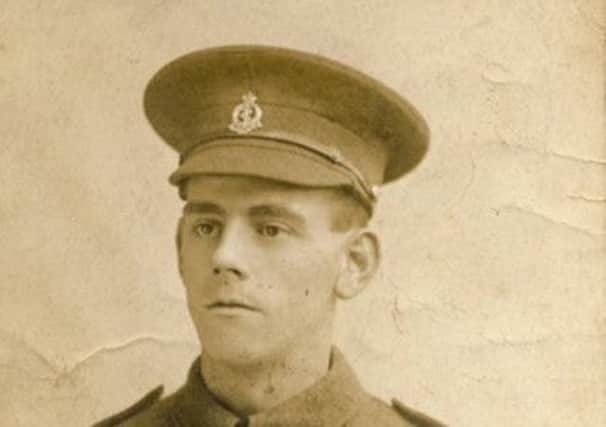An odyssey from a Yorkshire pit to the hell of Gallipoli


TODAY, the Turkish coastline is famous for its fine beaches, dramatic clifftops and sun-drenched turquoise sea.
But a century ago it was not tourists who flocked here in their droves, it was soldiers. By February 1915, the fighting on the Western Front had reached a deadlock and the British were eager to find a short cut to victory in a war that appeared to have no end in sight.
Advertisement
Hide AdAdvertisement
Hide AdThey decided to attack the Gallipoli Peninsula on the western shore of the Dardanelles, the idea being to gain a foothold and then capture Constantinople. By doing this they hoped to link up with the Russians and knock Turkey out of the war.
Allied troops landed at Gallipoli in April but met with fierce resistance from the Turkish army. Among the hundreds of thousands of British soldiers who took part in the ill-fated campaign was Joe Cope, a coal miner from South Yorkshire.
Joe was one of a family of 13 from Pogmoor, near Barnsley, who had just celebrated his 22nd birthday when war broke out.
As well as being a pit worker he was also a member of the St John Ambulance Brigade and had some nursing and first aid experience. He volunteered for the Royal Army Medical Corps (RAMC) but was not called up until February 1915.
Advertisement
Hide AdAdvertisement
Hide AdHe was sent to the Dardanelles and landed on the peninsula on October 18, more than six months after the campaign began. His brother, Henry, was also involved and they both wrote letters home that were published in our sister newspaper, the Leeds Mercury.
Both men survived the war. Joe’s son, Joseph, later recorded an interview with his father about his experiences and still has his wartime diary.
When he arrived in Gallipoli Joe was put on stretcher-bearing duties and his diary and letters provide an insight into what life was like for those men stationed on this beautiful, yet remote, headland.
We think of Turkey as having a hot and dry climate but one of the striking aspects of Joe’s diaries are the references to the poor weather. “We had a most terrible thunderstorm. It started in the afternoon but it did not rain until the evening,” he writes in one entry.
Advertisement
Hide AdAdvertisement
Hide Ad“We had got to bed but the rain simply washed us out of our dugouts and we were compelled to walk about the cliff for a considerable time naked until the rain ceased. If you could have seen us you’d have laughed yourself sore.”
In December, Joe fell ill and wrote a letter home from his sickbed. “I cannot say how long the war will last in this part, but there seems to be very little difference now to when we first landed here. The cliff, where we are billeted, will be more than a hundred feet high. Every inch of the land that was occupied was in the range of fire.”
He mentions a sergeant who was “shot in the brain” and had to be tied to a stretcher. “He nearly went mad,” he writes, before adding: “The men who are still in England don’t know they are born yet.”
Joe was diagnosed with jaundice and spent several weeks in Malta convalescing. Afterwards he asked to be posted to Egypt, where he believed his brother had been sent, but Henry had left for Mesopotamia. Instead he served the remainder of the war with the Scottish 42nd Lowland Division as a nursing orderly.
Advertisement
Hide AdAdvertisement
Hide AdHe was part of the advance into Palestine with General Allenby, supported by Lawrence of Arabia’s troops. Again the weather was atrocious. “Palestine was bad and there’s one entry where he talks about being knee deep in mud,” says Joseph.
The diaries record the advance towards Gaza, Jerusalem and then Jaffa (now Tel Aviv) and include reference to a surprising number of air attacks. “A bomb dropped near our camp amongst our company of infantry men inflicting 80 casualties, 40 of which died outright,” he writes.
“If you read his diaries and letters there was a lot of time spent doing fatigues. He mentions sweeping wells in Palestine and then suddenly 100 or so wounded men are brought into the hospital. He never really talked much about the horrible details, but he must have witnessed some terrible sights,” says Joseph.
However, there were some lighter moments amid all the drudgery and suffering. “He told us he once that he advanced on a camel, which he said cured his colitis.”
Advertisement
Hide AdAdvertisement
Hide AdIn April 1918, his division was sent to France to help repel what proved to be the last German push. By August the war had swung decisively in the Allies favour and his diary entries come to an end. “He’d been in a few hot spots and it’s only recently struck us just how lucky he was to have survived all of that,” says Joseph.
After the war Joe returned to Grimethorpe Colliery, marrying Gertrude in 1922. He left mining four years later following the General Strike and went on to become foreman at Barnsley Cemetery. “He was a grave digger and he’d had to dig graves in Gallipoli, so that must have brought back some memories for him.”
They settled down and started a family, remaining in the town for the rest of their lives. Joseph says his father seldom talked about the war, but when he did, he did so without bitterness.
There is one poignant moment, though, that perhaps encapsulates the tragic price paid by so many of these young men who were fighting far away from home.
“When we pressed him once for some gory battlefield details he said he’d never forgotten the dying words of a young lad he’d picked up who gasped, “I wonder what my Mam’ll say.”